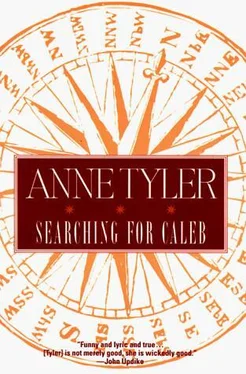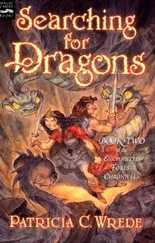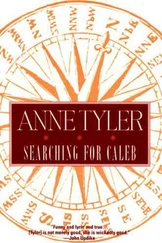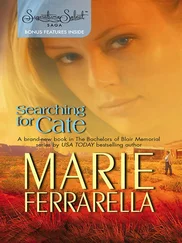Anne Tyler - Searching for Caleb
Здесь есть возможность читать онлайн «Anne Tyler - Searching for Caleb» весь текст электронной книги совершенно бесплатно (целиком полную версию без сокращений). В некоторых случаях можно слушать аудио, скачать через торрент в формате fb2 и присутствует краткое содержание. Жанр: Современная проза, на английском языке. Описание произведения, (предисловие) а так же отзывы посетителей доступны на портале библиотеки ЛибКат.
- Название:Searching for Caleb
- Автор:
- Жанр:
- Год:неизвестен
- ISBN:нет данных
- Рейтинг книги:5 / 5. Голосов: 1
-
Избранное:Добавить в избранное
- Отзывы:
-
Ваша оценка:
- 100
- 1
- 2
- 3
- 4
- 5
Searching for Caleb: краткое содержание, описание и аннотация
Предлагаем к чтению аннотацию, описание, краткое содержание или предисловие (зависит от того, что написал сам автор книги «Searching for Caleb»). Если вы не нашли необходимую информацию о книге — напишите в комментариях, мы постараемся отыскать её.
Searching for Caleb — читать онлайн бесплатно полную книгу (весь текст) целиком
Ниже представлен текст книги, разбитый по страницам. Система сохранения места последней прочитанной страницы, позволяет с удобством читать онлайн бесплатно книгу «Searching for Caleb», без необходимости каждый раз заново искать на чём Вы остановились. Поставьте закладку, и сможете в любой момент перейти на страницу, на которой закончили чтение.
Интервал:
Закладка:

Duncan Peck has a fascination for randomness and is always taking his family on the move. His wife, Justine, is a fortune teller who can't remember the past. Her grandfather, Daniel, longs to find the brother who walked out of his life in 1912, with nothing more than a fiddle in his hand. All three are taking journeys that lead back to the family's deepest roots...to a place where rebellion and acceptance have the haunting power to merge into one....
The fortune teller and her grandfather went to New York City on an Amtrak train, racketing along with their identical, peaky white faces set due north. The grandfather had left his hearing aid at home on the bureau. He wore a black suit, pearl-gray suspenders, and a very old-fashioned, expensive-looking pinstriped collar-less shirt. No matter what happened he kept his deep-socketed eyes fixed upon the seat in front of him, he continued sliding a thumb over the news clipping he held in Ms hand.
Either the train had turned his deafness absolute or else he had something very serious on his mind, it was hard to tell which. In any case, he would not answer the few things the fortune teller said to him.
Past his downy white head, outside the scummy window, factories and warehouses streamed along. Occasionally a leftover forest would coast into view and then out again-twisted bare trees, trunks ripped by lightning, Ws covered with vines, tangled raspy bushes and beer cans, whisky bottles, rusted carburetors, sewing machines, and armchairs. Then some town or other would take over. Men wearing several layers of jackets struggled with crates and barrels on loading docks, their breaths trailing out of their mouths in white tatters. It was January, and cold enough to make the brick buildings appear to darken and condense.
The fortune teller, who was not a gypsy or even Spanish but a lanky, weedy blond woman in a Breton hat and a faded shift, took a National Geographic from a straw bag on the floor and started reading it from back to front. She flicked the pages after barely a glance, rapidly swinging one crossed foot. Halfway through the magazine she bent to rummage through the bag again. She felt her grandfather slide his eyes over to see what she was keeping there. Tarot cards? A crystal ball? Some other tool of her mysterious, disreputable profession? But all she showed was a spill of multicolored kerchief and then a box of Luden's cough drops, which she took out and offered him. He refused. She put one in her mouth, giving him a sudden smile that completely upturned every one of her pale, straight features. Her grandfather absorbed it but forgot to smile back.
He returned to his view of the seat ahead, a button-on antimacassar with an old lady's netted hat just beyond.
In his hand, stroked by his puckered thumb, the newspaper clipping first rustled and then wilted and drooped, but the fortune teller knew it by heart anyway.
TABOR
Suddenly on December 18, 1972, Paul Jeffrey, Sr., of New York City, formerly of Baltimore. Beloved husband of Deborah Palmer Tabor. Father of Paul J. Tabor, Jr., of Chicago and Theresa T. Hanes of Springline, Massachusetts. Also survived by five grandchildren and seven great-grandchildren.
Services will be held Thursday at the . . .
"My throat is dry, Justine," her grandfather said.
"I'll get you a soda."
"What?"
"A soda."
He drew back, offended. No telling what he thought she had said. Justine patted his hand and told him, "Never mind, Grandfather. I'll just be gone a minute."
She left, sidling between shopping bags and weekend cases along the narrow aisle, holding tight to her saucer-like hat. Three cars up, she paid for two root beers and a sack of Cheez Doodles. She returned walking carefully, opening doors with her elbows and frowning at the plastic cups, which were filled to the brim. Just inside her own car, the Cheez Doodles fell and a man in a business suit had to pick them up for her.
"Oh! Thank you!" she said, and smiled at him, her cheeks grown suddenly pink. At first glance she could be taken for a young girl, but then people saw the fine lines beginning to show in her skin, and the faded blue of her eyes and the veined, parched, forty-year-old hands with the scratched wedding band looking three sizes too large below one knobby knuckle. She had a ramshackle way of walking and a sharp, merry voice.
"Roof beer, Grandfather!" she sang out. If he didn't hear her, all the rest of the car did.
She put a cup in his hand, and he took a sip. "Ah yes," he said. He liked herby things, root beer and horehound drops and sassafras tea. But when she tore open the cellophane bag and presented him with a Cheez Doodle-a fat orange worm that left crystals on his fingertips-he frowned at it from beneath a tangle of white eyebrows. He had once been a judge. He still gave the impression of judging everything that came his way. "What is this," he said, but that was a verdict, not a question.
"It's a Cheez Doodle, Grandfather, try it and see."
"What's that you say?"
She held out the bag, showing him the lettering on the side. First he replaced the Cheez Doodle and then he wiped his ringers on a handkerchief he took from his pocket. Then he went back to drinking root beer and studying the clipping, which he had laid flat on one narrow, triangular knee. "Theresa," he said. "I never cared for that name."
Justine nodded, chewing.
"I don't like difficult names. I don't like foreignness."
"Perhaps they're Catholic," Justine said.
"How's that?"
"Perhaps they're Catholic."
"I didn't quite hear."
"Catholic!"
Faces spun around.
"Don't be ridiculous," her grandfather said. "Paul Tabor went to the same church I did, he was in my brother's Sunday school class. The two of them graduated from the Salter Academy together. Then this-dissatisfaction set in. This, this newness. I can't tell you how many times I've seen it come to pass. A young man goes to a distant city instead of staying close to home, he gets a job, switches friends, widens his circle of acquaintances. Marries a girl from a family no one knows, lives in a house of unusual architecture, names his children foreign names that never were in his family in any preceding generation. He takes to traveling, buys winter homes and summer homes and vacation cottages in godforsaken states like Florida where none of us has ever been. Meanwhile his parents die and all his people just seem to vanish, there's no one you can ask any more, 'Now, what is Paul up to these days?' Then he dies himself, most likely in a very large city where there's nobody to notice, only his wife and his barber and his tailor and maybe not even the last two, and what's it for? What's it all about? Now in Paul's case I just couldn't say for certain, of course. He was my brother's friend, not mine. However I will hazard a guess: he had no stamina. He couldn't endure, he wouldn't stay around to fight it out or live it down or sit it through, whatever was required. He hadn't the patience. He wanted something new, something different, he couldn't quite name it. He thought things would be better somewhere else. Anywhere else.
And what did it get him? Watch, next time I'm in Baltimore I'll tell the family, 'Paul Tabor died.' 'Paul who?' they'll say. 'Paul Tabor, it was in the Baltimore Sun. Don't you read it any more? Don't you know?' Well, of course they do read it and would catch any familiar name in a flash but not Paul Tabor's. Forgotten, all forgotten. He discarded us, now he's dead and forgotten. Hear what I say, Justine. Do you hear?"
Justine smiled at him. "I hear," she said.
She had moved away from Baltimore herself. She and her husband and daughter now lived in Semple, Virginia; in another place last year and another the year before that. (Her husband was a restless man.) Next week they were moving to Caro Mill, Maryland. Was it Caro Mill? Caro Mills?
Читать дальшеИнтервал:
Закладка:
Похожие книги на «Searching for Caleb»
Представляем Вашему вниманию похожие книги на «Searching for Caleb» списком для выбора. Мы отобрали схожую по названию и смыслу литературу в надежде предоставить читателям больше вариантов отыскать новые, интересные, ещё непрочитанные произведения.
Обсуждение, отзывы о книге «Searching for Caleb» и просто собственные мнения читателей. Оставьте ваши комментарии, напишите, что Вы думаете о произведении, его смысле или главных героях. Укажите что конкретно понравилось, а что нет, и почему Вы так считаете.












